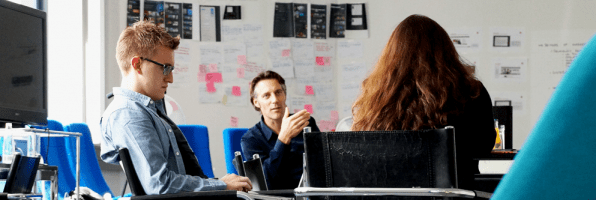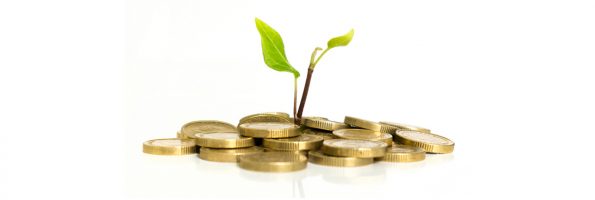Notre Dame Startup News, and More – Chicago News

Let’s explore some of the most interesting stories that have emerged from Chicago business schools this week.
Mendoza MBA Student’s Tech Startup Secures $600K Investment – Mendoza Ideas & News
Notre Dame University’s Mendoza College of Business recently profiled current student Cory Bailey ’18, whose startup SecūrSpace is to trucks and shipping containers what Airbnb is to housing.
Bailey explains that SecūrSpace, which recently secured a $600,000 investment, attempts to provide an effective solution to the issue of temporary storage sites outside of normal shipping routes.
It’s not uncommon in the shipping world for trucks to tack on an additional 50-mile trip to a temporary storage site, Bailey explained to Mendoza Ideas & News. “And so these trucks are taking these containers way outside of L.A. and New York and other port cities because they’ve got nowhere to put them,” he said.
Thanks to the aforementioned donation, which mostly came from a Notre Dame alum, Bailey hopes to expand his project in the near future.
You can read more about Bailey and SecūrSpace here.
How a Room’s Lighting Shapes Our Decisions – Kellogg Insights
Northwestern University Kellogg School of Management assistant professor of marketing Ping Dong and Feinberg School of Medicine associate professor of psychiatry and behavioral sciences Dorothy Sit recently published new research that explores how a simple thing like lighting “can change how likely we are to make pleasurable versus practical decisions.”
Dong writes, “Ambient light is a very important experience that is easily manipulated. This shows a new psychological consequence of darkness—consumers more often choose the option that provides immediate pleasure.”
According to the article, there’s a very real possibility that “consumers are also more likely to make pleasurable choices in darker settings—reaching for a candy bar instead of an apple, or buying trendy high heels instead of practical flats—not because they feel physically hidden, but because that feeling of psychological distance frees them to do what they really want.”
You can read more about the duo’s curious research here.
Linking Sustainability, Corporate Governance, and Gender – Quinlan School of Business Blog
Starting next month, Quinlan School of Business management professor Anne Reilly will present ongoing research into “significance of gender diversity in corporate sustainability governance” at several international conferences this year.
Reilly explains that for the second paper, she and her team found that “almost half of the companies studied have at least one person as a designated sustainability leader, and over 50 percent of these leaders are women—compared to the typical 25 percent representation of women executives.”
She elaborates, “Companies are continuing to develop governance roles dedicated to sustainability, and this accountability should strengthen their strategic emphasis on this critical issue. Further, the presence of women leaders as active change agents for sustainability supports progress in gender diversity and inclusion in executive governance.”
Read more about Reilly’s research here.
Harvard Helps Business Students Take Startups to NYC

Launching a startup isn’t easy, but Harvard Business School is working to change that for its alumni with the start of its new RISE program. Put together by Harvard’s Rock Center for Entrepreneurship, the RISE program will help HBS graduates accelerate the growth of their NYC startups.
With the goal of seeing more of its alumni entrepreneurs make it big, the new HBS RISE program will offer a range of benefits and support. Planned programming will help new enterprises with the many challenges that accompany startup life—from developing culture to hiring employees, building leadership skills, managing boards, raising funds, optimizing sales, and more. The eventual goal is to help small ventures successful scale from just a handful of employees to hundreds.
In order to participate in the program, HBS alumni have to own a company that is revenue generating and has already raised $1 million in capital. These qualifications were set to help ensure that participating companies have the best chance for successful scaling.
YOU MAY ALSO LIKE: More Harvard MBAs Are Turning to Politics
According to Professor Thomas Eisenmann, faculty chair of the Rock Center, the RISE program is all about helping enterprises scale individually. “In the RISE program, HBS faculty members, alongside seasoned entrepreneurs, will convey best practices and frameworks to help entrepreneurs address startup challenges that can make or break a company,” he explained in a news release. “The program has been developed to leverage extensive faculty research on what it takes to successfully scale an enterprise.”
HBS alumni chosen for the program can expect to learn about scaling their businesses from both faculty and peers. RISE will be broken down into sessions, each of which will have curated content developed by other successful alumni entrepreneurs and investors. At the end of each session, a roundtable discussion will allow for candid conversation between peers where founders can discuss challenges and offer advice.
Nine HBS alumni founders have already been accepted into the first RISE cohort, including:
This article has been edited and republished with permissions from our sister site, Clear Admit.
MIT Sloan Hosts Talk About the Modern Value of Old-School Advertising

Even for newer customers, there is an undeniable value in the old methods of advertising, according to cycling startup Peloton Senior Brand Marketing VP Carolyn Tisch Blodgett, who recently spoke at MIT Sloan.
Founded in 2012, Peloton makes a high-end exercise bike that livestreams indoor cycling classes—sort of like your own private FlyWheel. According to Blodgett, Peloton is vertically integrated, which means that “employees design the hardware, the software, teach the classes, and even deliver the bikes.”
Largely through word-of-mouth, Peloton’s revenues exploded to $137.5 million in just four short years, which placed the company atop Crain’s Fast 50 list. Despite this rapid, significant growth, Peloton is trying to reach a broader audience beyond its base of “affluent suburban women” (see sticker price: $1,995 plus $39 per month subscription fee).
Digital advertising is just one part of Peloton’s overall marketing strategy—one that Blodgett believes becomes increasingly “more expensive and less effective” once you understand that every company is buying on Facebook in 2017.
Speaking recently at the MIT Sloan Martin Trust Center for MIT Entrepreneurship, Blodgett explained that Peloton has begun to “invest in offline channels” like TV commercials, radio spots, billboards, direct mail, and 29 new brick-and-mortar showrooms to build a “community of those for whom fitness is a core value.” She explains, “We’re always testing new media channels.” Especially channels that maximize the ability for consumers to have hands-on experience with the product. “Trying the bike is a really important part of the purchase journey.”
With the holiday shopping season in full swing, Blodgett explained the company’s newest commercial, saying “We spend a lot of time showing the product, but my favorite part is the scene where the daughter is riding a tricycle and looks up at mom on the bike. That’s an emotional side of the product, and we’ve never really told that story before.”
You can find out more about Peloton and its luxury services here.
Tactile Takes Top Prize at MIT Pitch Competition

In the first stage of MIT Sloan‘s ongoing $100k Pitch Competition, the early winners earned praise for social awareness.
Twenty teams presented 90-second elevator pitches then fielded questions from judges. The $5,000 top prize went to Tactile, a portable device that converts small text from agendas, printed receipts, and snail mail to braille, co-founded by Grace Li (SB ’17) and Charlene Xia. Li talked of the pressing need for a device like hers. “A lot of printed texts don’t have Braille translation, and there are 39 million visually impaired people.”
Boston’s “strong community for the visually impaired” has proven to be the ideal testing ground for Tactile where Li’s team is currently conducting beta testing. “We’re starting out in the U.S. market working with public institutions like libraries and schools, plus centers like the Carroll Center for the Blind and the Perkins School for the Blind.” According to the Sloan article, Tactile will “use the prize money to refine and streamline the prototype, intending to make the device even smaller.”
The $2,000 technology prize went to aam, a “smart device and app duo [that] reminds its user to take a birth control pill at a specific time and sends reminders to her phone if she forgets.” Co-founded by Aagya Mathur, MBA ’18, aam takes the form of a “birth control pill blister pack inserted into a smart sleeve.”
The second phase of the MIT $100k – dubbed “Accelerate” – pairs teams with mentors to publicly present new prototypes where teams will compete for a $10,000 prize and $3,000 audience choice award.
Chicago Booth Reveals Venture Challenge 2017 Winners

The University of Chicago Booth School of Business and the Polsky Center for Entrepreneurship and Innovation announced the winners of the 21st annual Edward L. Kaplan, ’71, New Venture Challenge (NVC) last week. NVC is one of the most prestigious startup programs in the country and a cornerstone of the Booth MBA experience. Continue reading…
Pepperdine University Investment Study Referenced In ‘USA Today’

A new article from USA Today, “How To Get Money For Your Entrepreneurial Dream,” featured a Private Capital Access report (PCA) by Pepperdine University and Dun & Bradstreet. According to the report, the PCA index exists to “measure the demand for, activity, and health of the private capital markets.”
Continue reading…
